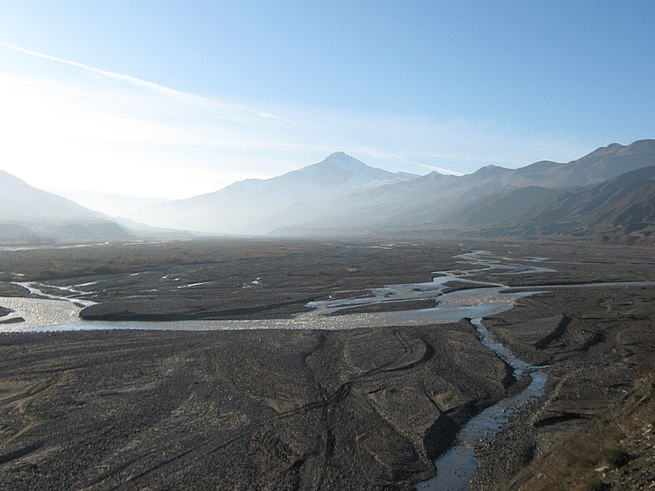-
River
A river is a natural flowing watercourse, usually freshwater, flowing towards an ocean, sea, lake or another river. In some cases a river flows into the ground and becomes dry at the end of its course without reaching another body of water. Small rivers can be referred to using names such as stream, creek, brook, rivulet, and rill. There are no official definitions for the generic term river as applied to geographic features, although in some countries or communities a stream is defined by its size. Many names for small rivers are specific to geographic location; examples are “run” in some parts of the United States, “burn” in Scotland and northeast England, and “beck” in northern England. Sometimes a river is defined as being larger than a creek, but not always: the language is vague.Rivers are part of the hydrological cycle; water generally collects in a river from precipitation through a drainage basin from surface runoff and other sources such as groundwater recharge, springs, and the release of stored water in natural ice and snowpacks (e.g., from glaciers). Potamology is the scientific study of rivers, while limnology is the study of inland waters in general. Most of the major cities of the world are situated on the banks of rivers, as they are, or were, used as a source of water, for obtaining food, for transport, as borders, as a defensive measure, as a source of hydropower to drive machinery, for bathing, and as a means of disposing of waste.
-
Creek (noun)
A small inlet or bay, often saltwater, narrower and extending farther into the land than a cove; a recess in the shore of the sea, or of a river; the inner part of a port that is used as a dock for small boats.
-
Creek (noun)
A stream of water (often freshwater) smaller than a river and larger than a brook.
-
Creek (noun)
Any turn or winding.
-
River (noun)
A large and often winding stream which drains a land mass, carrying water down from higher areas to a lower point, ending at an ocean or in an inland sea.
“Occasionally rivers overflow their banks and cause floods.”
-
River (noun)
Any large flow of a liquid in a single body.
“a river of blood”
-
River (noun)
The last card dealt in a hand.
-
River (noun)
A visually undesirable effect of white space running down a page, caused by spaces between words on consecutive lines happening to coincide.
-
River (noun)
One who rives or splits.
-
River (verb)
To improve one’s hand to beat another player on the final card in a poker game.
“Johnny rivered me by drawing that ace of spades.”
-
River (noun)
a large natural stream of water flowing in a channel to the sea, a lake, or another river
“the Mekong River”
“river pollution”
“the River Danube”
-
River (noun)
a large quantity of a flowing substance
“great rivers of molten lava”
-
River (noun)
used in names of animals and plants living in or associated with rivers, e.g. river dolphin.

